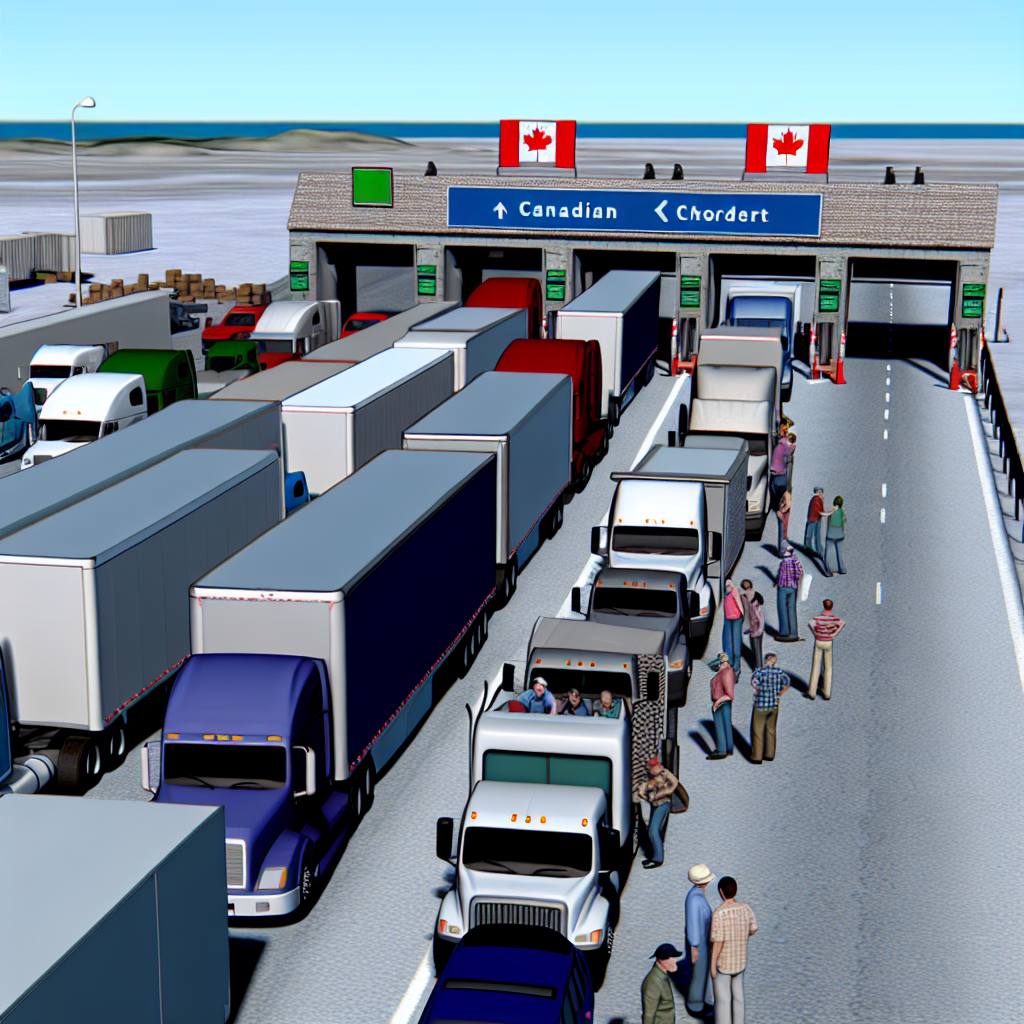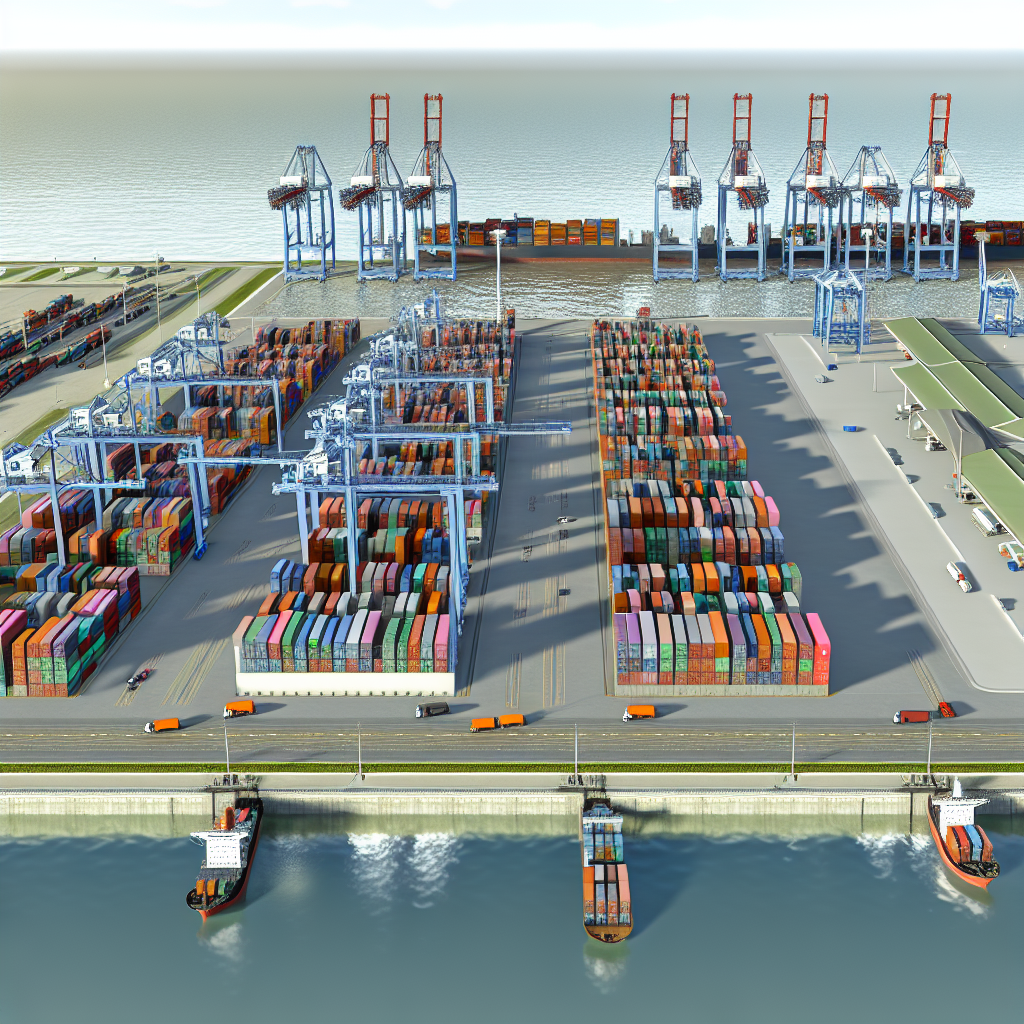The CBSA systems outage has exposed a major weakness in Canada’s border operations. This issue has led to significant backups, disrupting commercial fleets and damaging supply chain reliability. Many drivers report delays of four to five hours at crossing points. Industry leaders, including the Canadian Trucking Alliance (CTA), have been vocally critical of the situation.
Under increasing pressure from the government and the CBSA, it is clear that this problem poses a threat beyond just frustrated drivers; it jeopardizes the integrity of international commerce. The CTA insists that this is a persistent issue tied to chronic investment neglect in critical IT infrastructure, demanding urgent solutions to prevent future disruptions.

Causes of Backup Issues at CBSA
- IT Neglect: The Canada Border Services Agency (CBSA) has faced scrutiny over its failure to maintain and update its IT systems effectively, leading to vulnerabilities that result in regular outages. Such neglect has been highlighted repeatedly by industry associations, particularly the Canadian Trucking Alliance (CTA).
- Inadequate Investment: Investment in essential IT infrastructure has not kept pace with the growing demands placed on the services by increasing international trade and border traffic. CTA President Stephen Laskowski pointed out that this ongoing crisis stems from ‘investment neglect’ in critical technological frameworks that support border operations, which need immediate redress to avoid further complications.
- Recent Systematic Failures: Specific instances of outages, notably in September and July of 2025, display systemic failures due to a lack of reliable IT infrastructure. The September outage disrupted several crucial systems used for processing border crossings, and earlier incidents highlighted the increasing frequency and severity of these outages, suggesting a pattern of neglect and poor infrastructure investment.
- Broader Implications: Such issues not only affect truck drivers and border trade but have significant implications for Canada’s economy overall, impacting the country’s reliability as a trading partner. Laskowski’s statements reflect a growing frustration within the industry, which is deeply concerned about the positive trade relationships being jeopardized by these operational failures.
Summary
In summary, the ongoing problems faced by the CBSA and their impact on border operations can be classified as rooted in IT neglect and investment issues. Addressing these concerns is vital for ensuring future reliability and effectiveness in border management, which is crucial for international commerce.
User Experiences of Border Delays
The recent CBSA systems outage has led to alarming delays at Canada-U.S. border crossings, profoundly affecting commercial truck drivers. Many drivers have reported delays ranging from four to five hours, with some experiencing even longer wait times.
One notable account comes from Don Taylor, a Winnipeg truck driver, who recounted being stuck in Fargo for several days waiting for clearance. Taylor noted that drivers with specialized loads requiring additional processing faced even greater challenges, amplifying their delays.
These delays have considerable operational repercussions, leading to disruptions in logistics that ripple through the supply chain. The emotional strain on drivers is also significant; during some prolonged waits, drivers were provided food by authorities due to the extended delays. Industry leaders, including Stephen Laskowski, President of the Canadian Trucking Alliance (CTA), have criticized the CBSA for its outdated IT systems, which hinder timely processing and contribute to these significant delays.
These accounts underscore the real-world impact of the CBSA system outages on commercial drivers, highlighting the urgent need for investment in infrastructure and technology to prevent future disruptions and safeguard the livelihoods of those in the industry.
| Border Crossing | Reported Delay Time | Notes |
|---|---|---|
| Queenston-Lewiston Crossing | 4 to 5 hours | Significant delays experienced during CBSA system outage. |
| Peace Bridge Crossing | 4 to 5 hours | Advisories issued to avoid this crossing; lengthy wait times. |
| Emerson Crossing | Approx. 3 to 4 hours | Backup due to overall system challenges. |
| Pacific Highway Crossing | Approx. 2.5 to 3 hours | Reduced processing capacity impacted wait times. |
The table above summarizes the reported delay times at various border crossings impacted by the recent CBSA outage. These delays were exacerbated by the agency’s transition from electronic to manual processing due to the system failure. These statistics illustrate the severity of the situation and its impact on commercial traffic and supply chains.
Industry Reactions to Border Backups
The fallout from the recent CBSA systems outage, which prompted extensive border backups, has been intense within the trucking industry. The Canadian Trucking Alliance (CTA) has expressed strong dissatisfaction regarding how the situation has been managed, highlighting a collective sense of outrage among its members.
Stephen Laskowski, President and CEO of the CTA, voiced the frustration felt across the industry. He remarked, “Our members across the country are outraged, their customers outraged, and their drivers are threatening to leave the industry.” This quote underscores the serious emotional and economic toll that these delays have inflicted on drivers, who often work against tight schedules and heavy pressures to deliver cargo.
Drivers have reported chronic delays, with many experiencing waits of four to five hours or more at border crossings. Laskowski further criticized the government’s handling of the situation, stating, “Trade between the United States and Canada is regularly brought to a halt because Ottawa has failed to address outdated systems used to process shipments.” This commentary illustrates the urgent need for improvements in border processing that adequately cater to the demands of international trade, especially during periods of high traffic.
The implications for drivers are multifaceted. The ongoing delays not only threaten their job security and operational efficiency but also introduce significant stress. With the added pressure of a sluggish freight economy, the drivers are left to bear the brunt of delays that should be mitigated through better infrastructure and support from the government. In some severe cases, drivers have been trapped at the border for extended periods without adequate rest or access to food, raising concerns about their wellbeing.
Industry advocates, including Laskowski, have called for immediate investment in the Canada Border Services Agency’s IT systems, asserting that such neglect has contributed to a dramatic increase in the frequency and duration of border closures.
Ultimately, the reactions from the trucking industry highlight a critical need for systemic change to ensure that such operational failures do not recur, safeguarding not only drivers’ livelihoods but also the reliability of Canada’s trade relationships.

Conclusion and Recommendations for Improvement
The recent CBSA systems outage has underscored the urgent need for enhanced infrastructure and technological investments in Canada’s border operations. To address the persistent issues highlighted by these outages, several actionable recommendations must be implemented:
- Government Investment: It is critical for the Canadian government to prioritize immediate investment into the Canada Border Services Agency (CBSA) IT infrastructure. Upgrading outdated systems and incorporating advanced technology can significantly reduce the frequency and duration of operational failures that lead to long wait times at border crossings.
- Collaborative Approach: Industry stakeholders, including government agencies, trucking associations, and technology providers, must work together to develop comprehensive strategies for IT upgrades and improved processes. This collaboration could involve the establishment of dedicated task forces that focus solely on modernizing border operations to promote efficiency and reliability.
- Routine Evaluations: Conduct regular assessments of CBSA’s technological capabilities and operations to identify vulnerabilities and areas needing improvement. These evaluations would ensure that the systems remain robust in coping with increasing demands from international trade.
In the words of Stephen Laskowski, President of the Canadian Trucking Alliance: “This is an ongoing crisis of investment neglect of our IT trade infrastructure. The situation demands immediate action to safeguard our supply chain reliability and maintain Canada’s standing as a trustworthy trade partner.”
By implementing these recommendations, Canada can work towards a more resilient and efficient border management system, thus preventing future crises and facilitating smoother international trade.
Call to Action: It is essential for both the government and the industry to recognize the importance of these recommendations. Collaborative efforts will not only bolster operational efficacy but also ensure that the needs of commercial drivers and the broader economy are adequately met.
Together, we can address the underlying issues and transform our border operations into a system that supports growth and efficiency.
Official Statements from CBSA on the Systems Outage
In light of the recent systems outage affecting Canadian border operations, the Canada Border Services Agency (CBSA) has issued several official statements outlining their response to the situation. Here are the key points:
- Communication and Acknowledgment: CBSA acknowledged the outages promptly via social media and official channels, providing real-time updates. This reflected their commitment to transparent communication during a critical time.
- Apologies to Affected Travelers: In their announcements, the agency expressed understanding of the inconveniences faced by travelers and commercial drivers, offering sincere apologies for the delays encountered at border crossings.
- Manual Processing Procedures: To mitigate the impact of the outages, CBSA implemented manual processing at affected ports. This involved redirecting travelers from automation kiosks to border officers, particularly essential during peak traffic hours to manage congestion effectively.
- Restoration Updates: The CBSA kept the public informed about service restoration timelines, assuring those affected that operations were being restored promptly. This included updates on when kiosk services were fully functioning again.
- Focus on Long-term Solutions: Beyond immediate fixes, CBSA emphasized the need for long-term improvements to their IT infrastructure, recognizing that such upgrades could prevent similar outages from occurring in the future.
Through these actions, the CBSA demonstrates awareness of the challenges within their operational framework and their dedication to enhancing service reliability.
Frequently Asked Questions (FAQ)
What caused the recent CBSA systems outage?
The recent CBSA systems outage was attributed to a combination of outdated IT infrastructure and inadequate investment in necessary technology upgrades. Delays in processing due to these systemic issues have created significant disruptions at border crossings.
How long can drivers expect the delays to last?
Currently, delays at crossings are reported to be between four to five hours. While CBSA is working on restoring full functionality, it is unclear how long these delays may persist. Continuous updates from CBSA will provide more insight into timelines as recovery progresses.
What is being done to prevent future outages?
CBSA has acknowledged the need for long-term solutions and is focusing on upgrading their IT systems to enhance reliability. This includes increased government investment and collaboration with industry stakeholders to ensure better management of border operations.
How can drivers stay informed about the situation?
Drivers can stay updated through CBSA’s official channels, including their website and social media. Regular announcements will be made to inform about ongoing delays and progress towards resolution.
Suggested Keywords and Synonyms
- Border Delays: border wait times, customs processing delays, cross-border congestion, border crossing hold-ups, port of entry slowdowns.
- Commercial Fleet: freight carriers, trucking companies, logistics providers, transport operators, shipping fleets.
- Supply Chain Reliability: logistics stability, supply chain consistency, distribution dependability, supply chain efficiency, operational continuity.
- IT Infrastructure: information technology systems, network architecture, digital infrastructure, IT systems framework, technology backbone.
Additional Terms
Incorporate phrases such as “CBSA system outage,” “Canadian border services disruption,” “customs processing issues,” “trade flow interruptions,” and “cross-border trade impact.”
By strategically integrating these synonyms throughout the article, the content will not only become more readable but also rank better in search engine results, thus attracting more readers interested in border issues and associated topics related to international trade and trucking logistics.
The ongoing CBSA systems outage has not just caused inconvenient delays; it has deeply affected the lives of countless individuals who are vital to the movement of goods across borders. Drivers, the backbone of the commercial transportation industry, are facing not only the frustrations of waiting hours in line but also the stress that accompanies the uncertainty of their livelihoods.
Imagine Don Taylor, a seasoned truck driver from Winnipeg, whose ability to meet clients’ deadlines is now jeopardized by an outdated system. Stuck in Fargo for several days without clear communication about when he could cross the border, Don shared how anxious he felt thinking about his family waiting for him back home. Such delays are not just numbers on a report; they represent the absence of loved ones, the financial stress that builds up with every hour lost, and the fear of losing a job in an already challenging environment.
Stephen Laskowski, President and CEO of the Canadian Trucking Alliance, encapsulates the industry’s sorrow and frustration: “Our members across the country are outraged; their customers are outraged, and their drivers are threatening to leave the industry.” His words resonate deeply with a community struggling against relentless challenges posed by ineffective systems.
The supply chain, the very pulse of international commerce, is experiencing turmoil as well. The inadequacies in the Canada Border Services Agency’s (CBSA) operations extend beyond individual stories to threaten the economic fabric of Canada. With each minute a truck sits idle and unprocessed at a border, the ripple effect is felt across businesses reliant on timely deliveries and operational consistency.
This crisis highlights the urgent need for investment not just in technologies, but also in the human element behind the logistics and commerce. It’s a call for action for all stakeholders to recognize that with every delay experienced, it is not just a border crossing affected; it’s the welfare and stability of families and the economy under siege. Without change, we risk not only losing drivers to other industries but also the trust of our trading partners.
In summary, the narrative surrounding the CBSA systems outage needs to be enriched with the real experiences of those affected, urging all who read it to understand the profound implications of investment neglect in infrastructure. Immediate action is essential to transform these human experiences into a narrative of hope and stability for future operations across the Canadian borders.
Call to Action: Let us rally our efforts to ensure that every driver knows their struggles are heard and understood. Together, we can champion the much-needed changes to safeguard our supply chains and improve the livelihoods of those who drive them.


